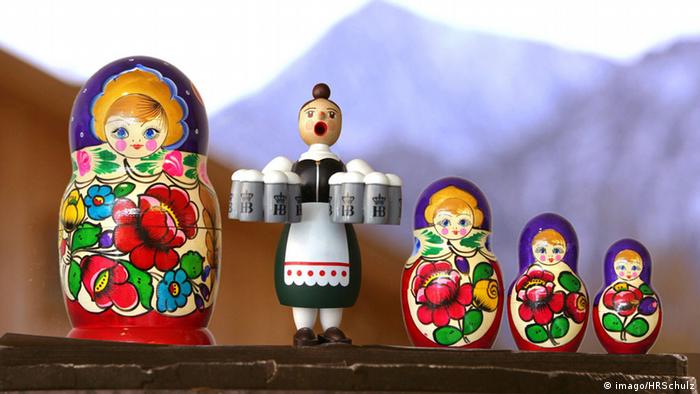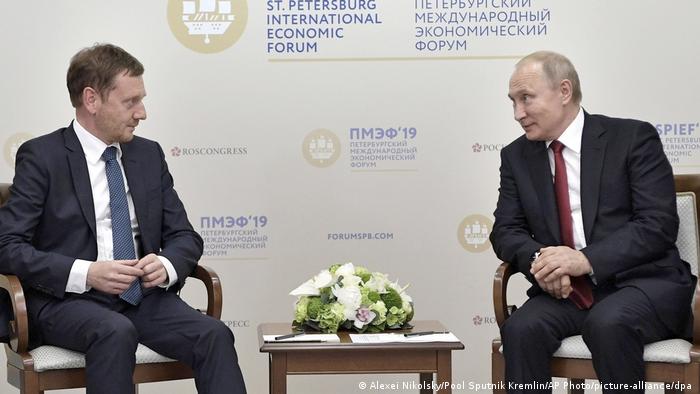A conservative national politician wants to end the sanctions on Russia. His party colleagues and security experts are outraged East German state politicians to support him. It comes to historical Biases?

Germany’s foreign policy is made in the capital. The Federal government in Berlin decides on foreign policy issues. This is not a non-binding principle, but written law. Only in consultation with the foreign office about the state can be leaders of other countries received, prescribes the rules of procedure of the Federal government.
If Saxony’s Prime Minister, Michael Kretschmer of the Christian Democratic Union of Germany (CDU) with the Ministry of foreign Affairs denied, as he was Russia’s Prime Minister Vladimir Putin in his state capital of Dresden invited, because there in front of the German reunification, the Soviet secret service KGB action?
Pronounced Kretschmer had his invitation when he met Putin at the International economic forum in St. Petersburg. However, in advance of the Christian Democrat one step removal and an end to the economy have called for sanctions against Russia. After the Russian annexation of the Ukrainian Peninsula of Crimea, the members of the European Union, among other things, an arms embargo and trade had imposed restrictions against Russia.

Michael Kretschmer (l) and Vladimir Putin at the International economic forum in St. Petersburg
No understanding of Kretschmer in Berlin
In the capital Kretschmers move met with little understanding. His party, the CDU will hold on to the sanctions, informed the Secretary-General, Annegret Kramp-karrenbauer. Criticism of Kretschmer received from the coalition partner SPD: “Here not only the EU but Germany is split in terms of foreign policy,” wrote the social-democratic Minister of state at the Federal foreign office, Michael Roth, on Twitter.
Equally outraged security experts: “Mr Prime Minister, responded you have a foreign-policy adviser?”, was asked Kretschmer, the head of the Munich security conference, Wolfgang Ischinger, who advised him: “If so, fire immediately.”
But Berlin is not Germany: The heads of government of the other East German länder, supported Kretschmer prompt. For the Federal Minister of the interior, Horst Seehofer, is a sign that Germany was still divided in East and West: “30 years after the fall of the Berlin wall, one can see that there are in the population of the new countries have a different view on Russia than in the old Federal States”, said Seehofer of the newspaper “image”.
Russia is to the East closer?
What is the role of the intra-German division for the views of Russia? “It is less about East Germany and Russia, but to the self-perception of East German,” says Russia expert Stefan Meister from the Heinrich-Böll-Foundation. “Russia is close to them”, geographically, but also because of their historical experience. Do the citizens of the Eastern German länder for the Russian Propaganda is more vulnerable, warns Meister.
Watch the Video 03:21
Russians, Europeans? Both!
After all: A third of Germans see Russia as a trustworthy Partner for Germany – China and the United States, as a survey conducted by the pollster Infratest dimap on behalf of the TV channel ARD and the newspaper “The world” showed at the beginning of the year.
Russia-expert master in the pro-Russian rhetoric Kretschmers also a harbinger of the upcoming election campaign in the Eastern German länder. In the autumn, to be elected in Saxony, Thuringia and Brandenburg new country parliaments.
Russia for the AfD is a “winning issue”
According to surveys, Kretschmer and his colleagues could be especially the right-wing populist party Alternative for Germany (AfD) dangerous. The AfD is just in their respective States is particularly strong, and has close contacts with the Russian policy against any criticism from other parties: “Good relations with Russia a winner than a loser theme are more likely to be,” said AfD co-founder Alexander Gauland.
Audio 05 listen:21
Interview with Michael Harms-to-Russia-sanctions
Because it’s more than just foreign policy and historical dimensions to: “of Course we have economic interests,” said Michael Harms, Executive Director of the Eastern Association of German economy in the DW. “Kretschmer has pointed out, in my view, completely right to point out, as especially the Eastern länder in Germany on the removal of the sanctions and intensify the economic relations are interested in.”
The Russian sanctions will hurt the Eastern States, emphasizing the country’s politicians, especially the agriculture of these regions benefited from the Export to Russia. To find the subject of Russia a single line between the East German länder and the Federal government, seems more than difficult. The forthcoming elections in the three East German Federal States could lead to the Federal government and the Länder are faster to agree.